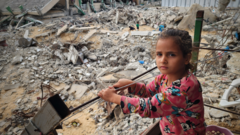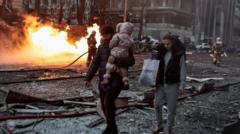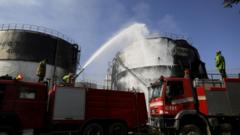Tensions escalate as the ICC's warrant against Israeli leaders raises international legal and political discussions.
**Netanyahu Decries ICC War Crimes Arrest Warrants as Antisemitic**

**Netanyahu Decries ICC War Crimes Arrest Warrants as Antisemitic**
Israeli Prime Minister disputes ICC's decision, claiming bias amidst ongoing conflict.
Israeli Prime Minister Benjamin Netanyahu has vehemently denounced the International Criminal Court (ICC) for issuing arrest warrants for war crimes against him and ex-Defence Minister Yoav Gallant, labeling the court's actions as "antisemitic." He criticized the ICC for what he claims are false accusations of deliberately targeting civilians during the recent conflict with Hamas, asserting that Israel strives to minimize civilian casualties. In a controversial move, the ICC has also issued a warrant for Hamas commander Mohammed Deif, who Israel states was killed in a recent military campaign.
Netanyahu asserted that the ICC's findings, which indicate "reasonable grounds" for believing that he and Gallant share criminal responsibility for actions during the ongoing Israel-Hamas conflict, reflect a flawed interpretation of the situation. He compared the ICC’s actions to the historical Dreyfus Affair, a reference to a notorious antisemitic incident in France over a century ago, and proclaimed that the court was wrongfully accusing Israel of engaging in a deliberate policy of starvation against Palestinian civilians.
U.S. President Joe Biden echoed Netanyahu’s sentiments, dismissing the ICC's move as "outrageous" and emphasizing an apparent lack of equivalence between Israel's military operations and Hamas’ actions. Both Israel and Hamas have publicly rejected the ICC's allegations, with Hamas stating that the warrants signify an important acknowledgment of perceived historical injustices faced by Palestinians.
In contrast, former Israeli Prime Minister Ehud Olmert criticized Netanyahu's handling of the conflict but disagreed with the ICC's findings, asserting that Israel has not engaged in acts that rise to the level of genocide or war crimes. Meanwhile, reports from the United Nations highlight severe humanitarian conditions in Gaza, raising questions about Israel’s military strategies.
The impact of the ICC’s warrants hinges on whether its member states, excluding Israel and the U.S., choose to enforce them. Several European nations have indicated respect for the ICC's decisions. The warrants stem from an escalation that began on October 7, when Hamas launched a deadly attack on Israel, resulting in significant casualties, to which Israel reacted with a devastating military onslaught in Gaza. According to various sources, tens of thousands have died in the ensuing conflict, underlining the urgent humanitarian crisis now faced by civilians caught in the crossfire.
As the situation evolves, both legal and political ramifications continue to unfold, with calls from Palestinian factions for accountability of Israeli leaders growing louder amidst an atmosphere rife with contention and grief.
Netanyahu asserted that the ICC's findings, which indicate "reasonable grounds" for believing that he and Gallant share criminal responsibility for actions during the ongoing Israel-Hamas conflict, reflect a flawed interpretation of the situation. He compared the ICC’s actions to the historical Dreyfus Affair, a reference to a notorious antisemitic incident in France over a century ago, and proclaimed that the court was wrongfully accusing Israel of engaging in a deliberate policy of starvation against Palestinian civilians.
U.S. President Joe Biden echoed Netanyahu’s sentiments, dismissing the ICC's move as "outrageous" and emphasizing an apparent lack of equivalence between Israel's military operations and Hamas’ actions. Both Israel and Hamas have publicly rejected the ICC's allegations, with Hamas stating that the warrants signify an important acknowledgment of perceived historical injustices faced by Palestinians.
In contrast, former Israeli Prime Minister Ehud Olmert criticized Netanyahu's handling of the conflict but disagreed with the ICC's findings, asserting that Israel has not engaged in acts that rise to the level of genocide or war crimes. Meanwhile, reports from the United Nations highlight severe humanitarian conditions in Gaza, raising questions about Israel’s military strategies.
The impact of the ICC’s warrants hinges on whether its member states, excluding Israel and the U.S., choose to enforce them. Several European nations have indicated respect for the ICC's decisions. The warrants stem from an escalation that began on October 7, when Hamas launched a deadly attack on Israel, resulting in significant casualties, to which Israel reacted with a devastating military onslaught in Gaza. According to various sources, tens of thousands have died in the ensuing conflict, underlining the urgent humanitarian crisis now faced by civilians caught in the crossfire.
As the situation evolves, both legal and political ramifications continue to unfold, with calls from Palestinian factions for accountability of Israeli leaders growing louder amidst an atmosphere rife with contention and grief.


















